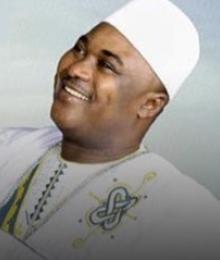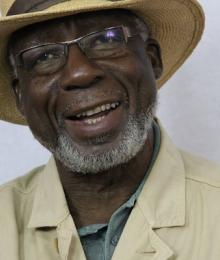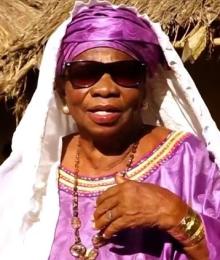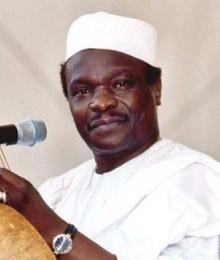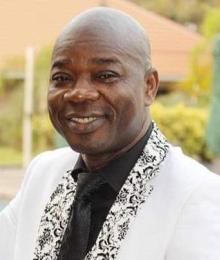
Kerfala Kanté (1959-2019) was a legendary Guinean musician, nicknamed "the bird of Sankara". Born in 1959 in Koumandi-Koura in a family of renowned griots, he swam from a young age in the rich Mandingue musical tradition. A virtuous multi-instrumentalist with both balloon and guitar, he was distinguished by his talent to revive traditional music with bold and modern arrangements. His compositions skillfully mixing ancestral sounds and contemporary accents have helped to radiate the Mandinga cultural heritage around the world.
Composer-songwriter and unparalleled performer, Kerfala Kanté left an indelible imprint thanks to cult tubes such as "Mansa Ba", "Woussè Woussè" and "Yarabi Konkon". A true ambassador of Guinean music, he seduced the crowds on both sides of the Atlantic with his scenic charisma, his powerful voice and his enchanting melodies. His premature death in 2019 at the age of 60 was an immense loss for the artistic and cultural world, orphaned by an inevitable icon of African music.
Introduction
Kerfala Kanté, nicknamed "the bird of Sankara", was an internationally renowned Guinean Mandinga artist. Born in 1959 in Koumandi-Koura in the Faranah region, he came from an ancient family of griots and has radiated traditional Mandingue music through modern compositions and arrangements. His multidisciplinary talent as a composer-songwriter, balladist, guitarist and singer has marked the history of Guinean and West African music. His unique voice and enchanting melodies earned him immense popularity until his premature death in 2019 at the age of 60.
Education
From an early age, Kerfala Kanté was immersed in the rich Mandinga musical culture thanks to his father Kemo, a renowned balladist. At only 10 years old, the young Kerfala was already regarded as a small master of the balloon, very appreciated in his native village of Koumandikoura. Five years later, he received his first dry guitar, which he worked arduously to develop his own unique style, quickly becoming a highly sought-after "ambiance" for traditional ceremonies such as baptisms, weddings and other family reunions.
Early career
Kerfala Kanté's constant trips between his village and the town of Faranah allowed him to get acquainted with musicians from the pioneering group "Tropical Djoli Band", who did not hesitate to hire him after a brief visit to the prefecture's instrumental ensemble. From 1980 to 1983, he was a true working leg of the "Tropical Djoli Band", contributing greatly to their success at the major national cultural joints with acclaimed titles such as "Déni Kéléni". His sensible words and his purified texts of banality already stood out.
In 1984, Kerfala joined the legendary band "Balla et ses Balladins" at the invitation of Ibrahim Kouyaté, the band's solo guitarist. Although the Balladins were going through a period of chaos due to lack of instruments, Kerfala's creative energy breathed a new breath into the band thanks to his participation in the band "Ninja".
Musical career
It was his encounter with Alpha Traoré James, a passionate musician and talent discoverer, which marked a turning point in Kerfala Kanté's career. James introduced it to the National Directorate of RTG for a first studio recording, before presenting it to producer Ahmadou Diouldé Sall, who immediately signed an exclusive contract with him.
The release of his first tape in 1991 was a genuine popular plebiscite, propelling "the bird of the Sankaran" to a victorious flight. Since then, Kerfala Kanté has been a success, surpassing the international charts with cult songs such as "Mansa Ba", "Woussè Woussè" and "Yarabi Konkon".
Success
The international success of Kerfala Kanté was driven by his incredible ability to modernize traditional Mandingue music while remaining deeply rooted in its cultural heritage. His bold arrangements mixing ancient instruments such as the balaphon with contemporary sounds have truly revolutionized the musical landscape of Guinea and West Africa.
His scenic charisma and powerful voice have enchanted the crowds during his many world tours, from Africa to Europe to the Americas. It was also a key element of the first edition of the album "Mandekalou: Mande Jeliou, The art and soul of the mande griots", highlighting the rich heritage of the mandingue griots.
Albums
Thro his prolific career, Kerfala Kanté has released several critically acclaimed albums, including:
- Que se passe-t-il ? (2002, Syllart)
- Senekela (2005, Syllart)
- New System (2008, Syllart/Socadisc)
- Fara Fina (2010, Syllart)
- Biyedi (2011, Sterns Music)
After a 10-year break, he made a much-anticipated return to the stage in 2016 with a double album "Merci" and "Djéli Laye", which he presented at two mega-concerts in Conakry.
Death and tributes
It is with immense sadness that the world of music has learned the death of the legendary Kerfala Kanté on July 18, 2019 in Conakry, following a short illness. At the age of 60, the "bird of Sankara" died forever, leaving her countless fans orphans in Guinea, Mali, Senegal and around the world.
Many tributes have flown to commemorate this immense artist, an indispensable pillar of Mandingue music, whose songs have buried entire generations. His premature death plunged the cultural and artistic world into deep mourning, deprived of a unique voice that has marked African musical history.
Private life
Although very discreet about his personal life, it is known that Kerfala Kanté came from a well-known family of Koumandikoura griots. Incarnating the values of humility and generosity characteristic of the Mandinga artists, he devoted a deep respect for ancestral traditions while revisiting them with boldness and creativity.
His attachment to his roots is equal to his immense talent and his ability to seduce the most diverse crowds through universal music, bringing joy, hope and fraternity. Kerfala Kanté left behind a rich musical heritage and the example of a complete artist, master of multiple instruments and genres.
Kerfala was married and father of several children including Kemo Kanté and Mbalou Kanté, both artists like their father.
Conclusion
The disappearance of Kerfala Kanté at the age of 60 was an invaluable loss for the culture of Guinea and Africa. This incomparable ambassador of the Mandingue musical tradition has succeeded in making it radiate far beyond the borders of the continent thanks to his creative genius and his instrumental and vocal virtuosity.
His enchanting melodies and lyrics of popular wisdom will remain engraved in the memories and hearts of millions of his fans around the world. "The bird of Sankara" did not get you, its wings just took their flight to other heavens, leaving on Earth a valuable legacy to pass on to future generations. Kerfala Kanté will forever remain an indispensable icon of African music.











